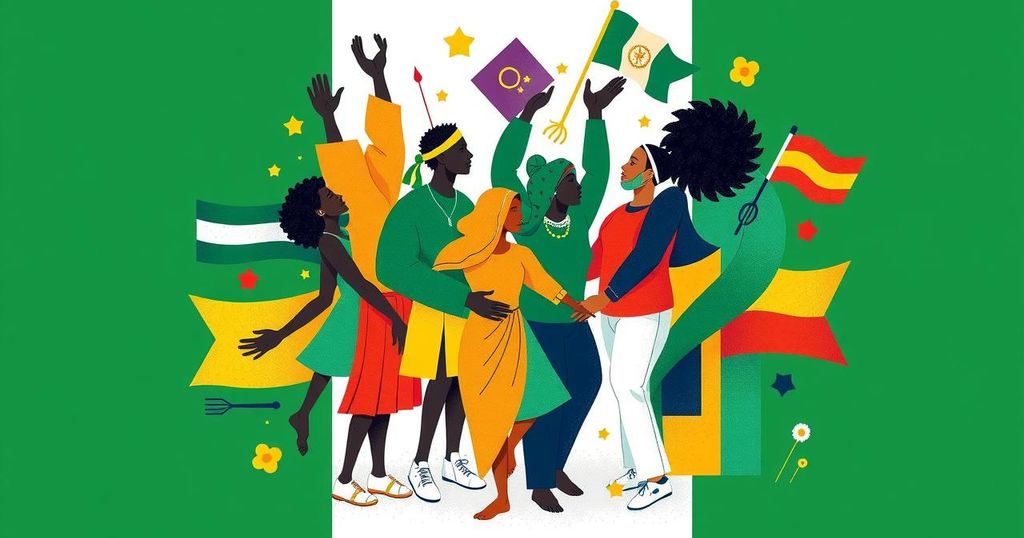Politics
AFRICA, ALHA, ALHAJI BASHIR TOFA, ASIA, CORRUPTION, DEMOCRACY, EUROPE, FEDERAL MILITARY GOVERNMENT, GOVERNANCE, HUMAN RIGHTS, IBB, IBRAHIM BADAMOSI BABANGIDA, INTERIM NATIONAL GOVERNMENT, MK, MKO ABIOLA, NATIONAL REPUBLICAN CONVENTION, NIGERIA, NORTH AMERICA, SANI ABACHA, SDP, SOCIAL DEMOCRATIC PARTY
Marcus Li
0 Comments
June 12: Remembering a Pivotal Moment in Nigeria’s Democratic Struggle
June 12, 1993, stands as a pivotal moment in Nigeria’s quest for democracy when over 14 million voters turned out to elect a new civilian president. Chief MKO Abiola emerged victoriously, yet the election was annulled by the military regime, leading to years of repression. The struggle against this despotism stirred courage throughout the nation, inspiring resistance and unity across diverse sectors. As we remember this historic day, it is important to engage newer generations in understanding its significance and uphold the principles of democracy for a better future.
June 12, 1993, marks a monumental chapter in Nigeria’s history. On that day, 14.29 million citizens made their way to polling stations for a critical presidential election that signaled an end to a repressive regime. The choice was between Chief MKO Abiola of the Social Democratic Party and Alhaji Bashir Tofa from the National Republican Convention. Ultimately, the overwhelming support for Abiola, who garnered at least 58.36 percent of the vote, demonstrated a collective yearning for true democracy, transcending ethnic and religious divides.
The election saw the accreditation of around 3,000 observers, including 135 from various developed nations, who monitored the election closely. They generally agreed that, unlike previous elections marred by favoritism and irregularities, the June 12 elections were fair and credible. Their consensus was that the conduct of the election was not only efficient but deserving of respect from the ruling military regime. Yet, General Ibrahim Badamosi Babangida’s government chose to disregard the electorate’s choice, annulled the results, and hindered the installation of an Interim National Government lacking legitimacy.
This act of tyranny threw Nigeria into six years of harsh military rule that stifled freedoms and set back progress. Faced with oppression, the spirit of resistance ignited across various sectors of society—from students to labor unions. This explosion of bravery gave birth to the National Democratic Coalition, which unified citizens, regardless of their backgrounds, against the oppressive military dictatorship. It was not just a struggle for power; it was fundamentally about Nigeria’s future and well-being.
Key figures in this fight included renowned leaders such as Pa Anthony Enahoro, Chief Bola Ige, and Dr. Fredrick Fasehun. Many of these champions of democracy paid the ultimate price, while others like Senator Bola Tinubu and Prof. Wole Soyinka continue to strive for the principles of freedom today. Their sacrifices highlight the high cost of resistance against despotism during this tumultuous period.
The casualty list is haunting. Lives were tragically lost to the regime’s brutality, including that of Alhaja Kudirat Abiola and Pa Alfred Rewane, among others. These events have left an indelible mark on Nigeria’s memory. Those who survived bear witness to the harrowing price paid for the fight for democracy.
The media played an essential role in documenting the struggles and serving as the voice against state tyranny. Fearless journalists, like Chris Anyanwu and Nosa Igiebor, faced oppression yet continued the fight with their pens, ensuring the injustices of their time would not be forgotten. I myself witnessed the repression firsthand; I was targeted by the regime’s agents early in my legal career, as I was involved in efforts to restore the June 12 mandate.
The memory of that fateful June day resonates differently today—especially with younger generations who may not fully grasp its significance. The freedom we enjoy now is a direct result of the sacrifices made during the June 12 struggle. It is essential that we as a nation work tirelessly to foster an understanding of this critical episode in our history. Failure to do so risks letting the spirit of our democracy dwindle.
As we aim for a more democratic, unified Nigeria, all stakeholders must play a role. The government is responsible for maintaining a democratic ethos, but the opposition must also provide credible alternatives that prioritize the country’s unity and progress. This is the moment for leaders on both sides to eschew divisive politics. Only then can we build a functional democracy that surpasses the challenges posed by past injustices. The spirit of June 12 must guide us in fostering a nation defined by equity, democracy, and perseverance for future generations,
Bamidele, Leader of the 10th Senate, writes from Abuja.
June 12, 1993, not only represents a significant electoral event but also symbolizes the resilience and hopes of the Nigerian people to secure their democratic space. The sacrifices made during this struggle against tyranny paved the way for Nigeria’s current democratic processes. It is crucial to keep the spirit alive, educate future generations, and ensure that both the government and opposition strive toward a unity that encapsulates the essence of the June 12 struggle. Maintaining and nurturing democracy is a collective responsibility that transcends any political divide.
Original Source: punchng.com




Post Comment